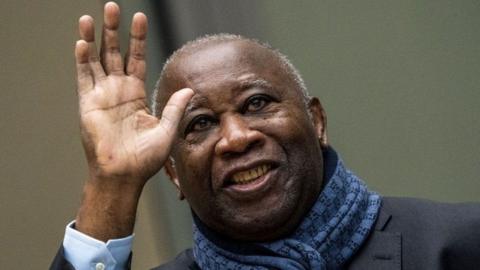Laurent Gbagbo: Why the former Ivory Coast president is returning back to his country after 10 years in exile

Former Ivory Coast President Laurent Gbagbo is expected to return home, 10 years after he was dragged before the International Criminal Court (ICC) on accusations of crimes against humanity.
Mr. Gbagbo has been living in the Belgian capital, Brussels since his release from detention three years ago.
His successor and rival President Alassane Ouattara invited him back.
He is the first former head of state to face trial at the ICC but later be cleared of all charges.
The 76-year-old faced charges after he refuse to accept defeat in the 2010 election which caused a civil war that led to the deaths of 3,000 people. He has always denied all accusations.
In March, the ICC appeal court maintained a 2019 judgement that freed Gbagbo, saying the prosecution failed to prove their case against him and Charles Blé Goudé, a supporter and former youth leader whobalso faced accusations of leading soldiers to back Mr. Gbagbo.

Why is Gbagbo returning back to his country?
After the ICC court freed him of all accusations, President Ouattara invited him to come back to Ivory Coast, which is still trying to get political stability. Mr. Gbagbo replied saying he wants to promote peace in the country.
Although there still exists bitterness and division a decade after the election, and civil war, observers say President Ouattara feel politically secure he won a controversial third term last year and he is willing to reconcile with his political enemy.
But others are pointing to the 2018 amnesty given to Gbagbo’s wife, Simone, and several others jailed for crimes they commit during the 2010-11 crisis, saying the reconciliation efforts has started for some time.
Six other former supporters of Mr. Gbagbo also returned two months ago after years in exile.
Why ICC cleared Laurent Gbagbo?
In 2019, judges ruled that prosecutors failed to show that there were plans to keep “Gbagbo in power” which include crimes against civilians, or “policy to attack civilian population”.
Presiding Judge Cuno Tarfusser said the prosecution also “fail to demonstrate that “what Gbagbo said in public started or caused the alleged crimes”.
In March, ICC appeals court upheld the acquittal and threwout the prosecution’s argument which says procedural errors was involved in how the original judgement was delivered.
Who is Laurent Gbagbo?
Mr. Gbagbo was born in the south-central region of Gagnoa in 1945 to a Catholic family. Mr. Gbagbo attended a Christian seminary and later became a history professor.
He started his political career with a trade union movement where he began to oppose Ivory Coast’s one-party system at the time.
He started his political career in the opposition but in the 1980s, he took a strong nationalist stance, which critics say bordered on xenophobia.
After 20 years in the opposition, he was finally elected as president in year 2000, but civil war broke out just two years later. Mr. Gbagbo’s supporters were accused of carrying out xenophobic attacks in the areas they control – against those that came from the mainly Muslim north, immigrants from neighbouring African countries, and Westerners.
Former colonial power France and the UN were also accused of not doing enough to put down the rebellion that split Ivory Coast into two.
The crisis led to the postponement of the 2005 presidential elections six times before it was finally held in 2010 Mr. Gbagbo refused to accept defeat to Mr Ouattara after he lost.
The five months of violence that followed saw some of the most brutal violence the country has ever seen.

Your prose forms vibrant pictures in my mind. I can easily picture every element you depict.